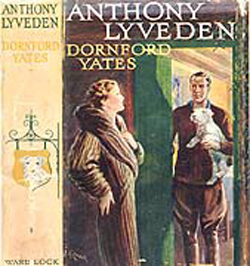
An original cover from 1921
I have never made any secret of the fact that my idea of comfort eating is mashed potatoes, a dish high in carbohydrates and fat.
Now at my advanced years I think I have to come out of the closet about my idea of a comfort read and introduce you to Dornford Yates.
Like mashed potato, in dietary terms, Yates has his faults, he is racist, misogynistic, class obsessed, jingoistic, and often writes prose of a tone so purple that one would be forced to call it puce.
Orwell called him the direct precursor of Fleming and his James Bond novels,(and he was not intending to flatter by that) he has also been credited with inspiring Enid Blyton and her adventure stories for children (now much discredited).
Yes I admit he is all of these things, but , if I want a moment of literary escapism having had my bellyfull of attempts to read uplifting works of literary merit, I go back and read and reread my Yates.
He was born in the 1880s and wrote best sellers during the first 50 years of the twentieth century.
He is most famous for his “Berry” series which could be called comedies of manners set in 1920s upper class, home county England and his “Chandos” novels which are straight thrillers with none of the sophistication of modern works but set at a time when the villain was a villain and possible either a Jew or a Hun.
But principally there is this wonderful British upperclass hero, Richard (who inexplicably is sometimes called William!) Chandos and his buddy Jonathan Mansell.
I have just finished re reading “Red in the Morning” a novel of this genre
first published in 1946.
In this, Gedge, the villain, dares to kidnap Chandos’ wife Jenny.
As he rescues her from Gedge’s clutches he says;
“You have laid hands on my wife, the punishment for that is death.”
Wonderful stuff that, and when Chandos eventually throttles Gedge and then goes back to talk to Mansel the conversation goes like this;
“Our gentleman friend ? (he said)
“Is dead”
“Damn you William,” said Mansel “I wanted to kill him myself”
With dialogue like that how can anyone fail to be seduced.
I first came across the Dornford Yates novels at home as there was a large selection of them in the bookcase in our drawing room.
As a voracious 12 and 13 year old reader , and this prior to the age of television, I devoured them whole.
This provides the necessary nostalgic suspension of critical thought from my analysis of Yates’ Oeuvre.
At that age his works were to me perfect expressions of chivalric nobility and all that I could ever want in terms of heroism and integrity.
As I did mature a little with the passing years I began to see that maybe he was not quite the liberated man I then aspired to, but now, in my middle age, and having totally forgotten all of the plots, he is perfect to return to.
If you want to give him a twirl I would recommend a duo of books. Anthony Lyveden, and its sequel, Valerie French.
These are probably his best works and I feel bear comparison with the atmosphere of mystery achieved by Alain Fournier in Le Grand Meulnes.
The best way to read them is with a patient spouse nearby who would appreciate the occasional guffaws as little vignettes of British chauvinism drop from Yates pen,and could stand being related same.
Despite all I still think he is a damned good read.

Comments
The comments are closed.